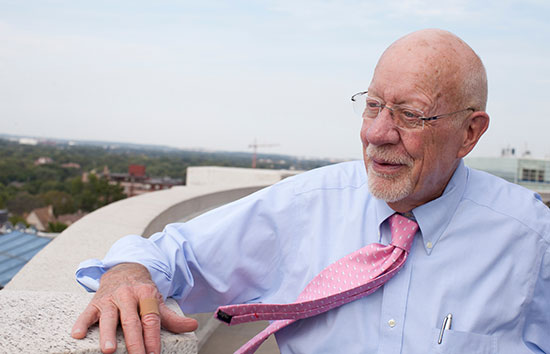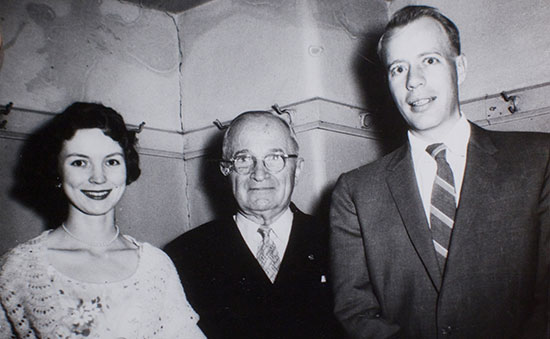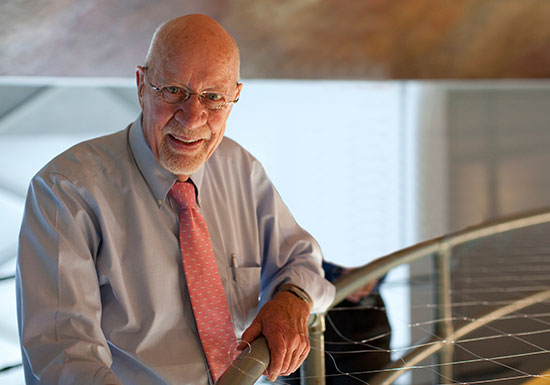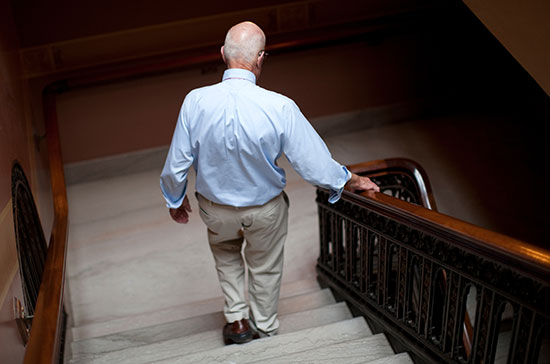
State Senator Fred Risser has kept a watchful eye over Wisconsin for more than six decades. He retires next month as the longest serving state legislator in U.S history. Risser also is the only WW II veteran currently serving in any U.S. state legislature. Photos courtesy of David Kidd, governing.com.
The Wisconsin Capitol Building is often the first thing state Senator Fred A. Risser sees in the morning and the last thing he sees at night. He currently lives across the street from this historic landmark, a monument of state government standing since 1917.
When he retires from the Wisconsin State Senate in January, Sen. Risser, 93, will continue to keep a watchful eye on the Capitol, just as he has the last 64 years as a lawmaker. And, he will himself be enshrined in the history of Wisconsin politics.
Sen. Risser, a lawyer and a Democrat representing Senate District 26 in Madison, is the longest serving state legislator in both Wisconsin and U.S. history.1 A World War II veteran, his service in the Wisconsin Legislature spans the terms of 13 governors.
Sen. Mark Miller, a fellow Democrat, said Risser brought a historical perspective to the work of the Senate. “He was a staunch advocate for human rights and protecting the environment,” Sen. Miller noted. “He insisted on conducting legislative business with dignity, fairness, and in accordance with basic democratic and progressive values.”
Regardless of political party affiliation, few would dispute the impressive breadth of Sen. Risser’s service and his influence on the public policies and institutions of this state.
“Somebody said there will never be another Fred Risser, and I believe that,” said Brian Rude, who served four terms in the Wisconsin Senate, starting in 1984.
Rude, a Republican, traded the Senate presidency with Risser in the 1990s as Wisconsin’s political winds shifted between party majorities. “I don’t believe you will ever see a legislator who will serve so long and do so much,” Rude noted.
A full account of Sen. Risser’s career in politics and law is impossible in a few pages of this magazine. But this article attempts to highlight some of the major events.
Family Roots

President Harry Truman flanked by Fred and his first wife, Betty, who died after 21 years of marriage. “I have been
blessed with having the opportunity of being married to two very wonderful women.”
Sen. Risser, born in 1927, was hard-wired for politics, following in the footsteps of three generations before him. His great-grandfather Colonel Clement Warner – a Civil War veteran – and his grandfather Ernest Warner served in the Wisconsin Legislature. Clement Warner served as a Unionist, and Ernest Warner as a La Follette Republican.
His father, Fred E. Risser, also a lawyer, served in the Senate from 1937 to 1948 as a member of the Progressive Party. The Risser Justice Center, built in the early 2000s, is a recognition of the Risser family’s contributions. All four generations represented the Madison area. The building, situated in downtown Madison, houses the state Department of Justice and the Wisconsin State Law Library.
“I knew from the day I was born that I was going to go into politics,” said Sen. Risser from his second-floor office in the State Capitol. “There was never any doubt about it.”
Risser grew up in Madison. His father served three terms as the Dane County district attorney, in addition to his work as a lawmaker, and ran his own law firm.
“As kids, he would have us out there nailing up posters on trees and going to church dinners with him,” said Risser, speaking about his father. “He was in politics most of my life as a younger person, and I knew I would do the same.”
By the time the young Fred Risser was about to graduate from high school, in 1945, the United States was still fighting World War II against Japan. He was 17.
He enlisted in the Navy and was ultimately stationed in Panama. After his military service, Risser attended Carleton College in Minnesota but later transferred to the University of Oregon, in Eugene, to obtain his undergraduate and law degrees.
“I had been out there one summer working in a logging camp, and I was looking forward to being independent,” said Risser, who also hitchhiked the West Coast.
“I wanted to be as far away from home as I could get,” Risser said. “I was always my father’s son. I wanted to make my own way and did not intend to return to Wisconsin.”
After law school, Risser’s father encouraged him to take the Wisconsin bar exam, just in case. While back home, Risser met his first wife, Betty, and decided to stay, embarking on a political journey that would span eight decades.
A Senator’s Rise

Risser and his wife will enjoy retirement with a bird’s-eye view of Wisconsin’s political scene from their condo across the street from the state Capitol. Here, he looks down from inside the Capitol dome. He takes pride in the building’s 12-year restoration that makes it a showpiece for Wisconsin.
Sen. Risser passed the Wisconsin bar exam and was admitted to practice law in 1953. He joined his father’s law practice, and the Democratic Party of Wisconsin.
Risser saw his political window open when Ivan Nestingen, a member of the Assembly representing Madison, announced his candidacy to become mayor of Madison.
“I knew if he got elected, I would run for his seat,” Risser said. “Nobody else knew that, but I knew it. So I went out and did my best to help him get elected mayor.”
In 1956, at age 29, Risser was elected to a two-year term in the Assembly. He won again in 1958 and 1960. Two years later, he was elected to the Senate, where he stayed for the next 58 years. State politics was much different back then, he said.
“You didn’t have strict party-line activity,” Risser noted. “Both parties had liberals and conservatives. The most conservative Senate members were Milwaukee Democrats. It was a part-time job, and you could campaign on a couple hundred dollars.”
When Risser joined the Assembly, Republicans held a significant majority, but it flipped in 1959 when Gaylord Nelson, a Democrat, won the gubernatorial election.
Risser, at age 31, was selected to be the Assembly-side chair of the powerful Joint Committee on Finance, which deals with budget appropriations and revenues.
“As chair of the Joint Finance Committee, I was able to make a name for myself, you might say,” Risser said. “I was tapped to help move the governor’s plan.”
The plan included creation of the Department of Administration, the unionization of municipal employees, development of the first Hill Farms State Office Building, and campaigns to create greater governmental transparency and control lobbying.
By the time Risser moved to the Senate in 1962, he was considered a veteran. His first term, he served as assistant minority party leader, then minority party leader for the next 10 years. Democrats gained control of the Senate in 1975, under Gov. Patrick Lucey.
Risser served as president pro tempore from 1975 to 1979. Under the Wisconsin Constitution, the lieutenant governor – who ran independently – served as the Senate president, regardless of the political party holding a Senate majority.
“That could be frustrating for the Senate’s majority party,” Risser said. “I helped create and pass a constitutional amendment, in 1979, which changed the Wisconsin Constitution so that the Senate could select their own presiding officer.”
That’s a change that has benefitted both parties. In other words, without that constitutional amendment, current Lieutenant Gov. Mandela Barnes, a Democrat, would be president of the Republican-controlled Senate. It was an institutional change.
But from 1979 to 2012, Risser served as Senate president when the Democrats controlled, which was most of the time (11 of 16 sessions), and parts of four other sessions. In total, Risser served 25 years as president of the Senate.
Building Bridges

Sen. Risser was hard-wired for politics, following the footsteps of three generations before him. An enthusiastic supporter of his state, he embraces all things Wisconsin, including, of course, cheese.
Rude, who served as Republican Senate president in the 1990s – trading that role with Risser – said his relationship with Risser was collegial and focused on the institution, as the role of Senate president “is an institutional role in addition to being a partisan one.”
“There was never a time when Fred lost his cool. He just did his job and did it very, very well. He was a liberal lion, and there was no question where he was coming from politically, but we had a great day-to-day relationship. He was a joy to work with.”
As Risser rose to prominence, he was also running a law firm, first as a partner with his father (who died in 1971), then as a solo handling general matters for long-time clients. He also argued a case before the Wisconsin Supreme Court with his father in 1963.
“I started as full-time lawyer and a part-time legislator,” Risser noted. “But as the legislature developed, I became a part-time lawyer and a full-time legislator.”
His proximity to the Capitol, he said, allowed him to manage both. Importantly, he said, his law career allowed him to have an independent voice as a legislator representing the people – he could afford to lose his Senate seat.
At home, Sen. Risser was building bridges in the Legislature. But he was also helping to establish Wisconsin’s role nationally. He served on the National Conference of Commissioners of Uniform State Laws, the National Conference of State Legislatures, and the Council of State Governments, serving as Midwest chair.
“I enjoyed participating in the extracurricular activities that were available to us,” Risser said. “When I was in leadership, I had an opportunity to participate in activities that would take me to the national Capitol. I’ve met almost every President since John F. Kennedy.”
Moving Policy

As Sen. Risser leaves office next month, he’ll likely count the 57 steps from his second-floor office to the Capitol
rotunda. He makes a point of never using the elevator. “I’ll miss the action, and spending time with different people with
different ideas,” he says.
According to the Wisconsin Legislative Reference Bureau,2 Sen. Fred Risser authored 163 enacted bills during his 64 years in the Legislature. He was the first author on 95 enacted bills, meaning he was the bill’s primary architect and chief proponent.
The first bill he ever authored – 1959 Wisconsin Act 26 – was enacted on May 5, 1959, on Risser’s 32nd birthday. A first glimpse of his commitment to public workers, the bill established more paid vacation time for state employees in continuous service.
More than 50 years later, in 2011, Risser would become one of 14 Democratic lawmakers to flee the state in opposition to a Republican bill, ultimately enacted as 2011 Wisconsin Act 10, which significantly curtailed the bargaining rights of public workers in Wisconsin.
All of Sen. Risser’s legislative activity cannot be recounted here, but a cursory review shows his distinct interest in public health. His fight against tobacco reportedly began in 1963, when he proposed a ban on cigarette sales to minors (it failed).
In 1983, Risser authored the first of several bills enacted as part of the Wisconsin Clean Indoor Air Act. The bill banned smoking in certain specified places, including educational facilities, offices, and restaurants with a seating capacity of more than 50.3
Risser pushed to expand the Clean Indoor Air Act’s reach over decades, helping to enact smoking bans in other specified places, including the 2010 ban on smoking in taverns, a historic achievement given the opposition from the powerful tavern and tobacco lobbies.
“Fred will long be remembered as a champion for smoking legislation,” Rude said. “He accomplished it the way he did so many other issues: he just kept at it. Even though he would get shot down, he would come back to raise the issue time and again.”
Behind the Movements
Never missing a roll call vote in 64 years, Risser worked on countless other bills to improve the health of and equality among Wisconsinites, including issues affecting women and environmental causes. But much of his work won’t be seen in stand-alone bills.
“I’m proud of the fact that I have been active in a lot of movements,” Sen. Risser said. “You can accomplish a lot if you give someone else credit. A lot of it is incorporating your ideas into the state budget, which is a key part of legislative work.”
In his time, Risser saw the state budget increase from $1 billion to $80 billion. As a Finance Committee member and Senate leader, Risser’s budgetary voice mattered.
For instance, Sen. Risser was on the Wisconsin Building Commission for approximately 50 years, helping fulfill a vision for a cohesive state government around the State Capitol and the U.W.-Madison campus through public construction projects.
When Sen. Risser first started out, there was one state-owned office building in Madison. Now there are 16, and other office facilities all over the state.
“Government really expanded and services and staff mushroomed,” Risser said. “During this growth period, we decided to renovate the State Capitol building.” This State Capitol restoration project, Rude said, is one of Risser’s greatest legacies.
An Institution Stands Tall
Constructed in 1917 and perched on Madison’s isthmus, between two lakes, the Wisconsin State Capitol is an architectural marvel. Over the years, it had been repaired and maintained, but in the 1980s, it was in need of serious renovation.
 Joe Forward, Saint Louis Univ. School of Law 2010, is a legal writer for the State Bar of Wisconsin, Madison. He can be reached by email or by phone at (608) 250-6161.
Joe Forward, Saint Louis Univ. School of Law 2010, is a legal writer for the State Bar of Wisconsin, Madison. He can be reached by email or by phone at (608) 250-6161.
Sen. Risser was Senate president in 1987 when the Legislature approved, under Gov. Tommy Thompson, a Capitol Master Plan for a single, large-scale renovation that would ultimately take more than 12 years and about $160 million. It was completed in 2001.
“That project was started by Fred and Speaker Tom Loftus, and it was able to continue under different leaders and even a party change,” Rude said. “We took control in 1993, just as Senate-wing work was starting. So I worked very closely with Fred on that.”
“Having the vision of doing the restoration as thoroughly as we did, and pushing it through various budgets, commissions, and boards, keeping it going in the midst of a heated partisan environment – that’s a huge legacy item for Fred,” Rude said.
The project brought modernization, with air conditioning and telecommunications, and is now a showpiece of Wisconsin government, and a main attraction among tourists.
“We retained the historic integrity of the structure,” Rude said. “I personally think Fred’s stewardship of the building and the institution is his legacy more than any other issue.”
Rude said he sparred with Risser on issues such as the future of service agencies, but Risser’s “persistent institutional view” has led to successful agencies such as the Legislative Reference Bureau, the Legislative Council, and the Legislative Audit Bureau.
Like the State Capitol, these are institutions that continue to serve Wisconsin regardless of party control. Risser, Rude said, recognized the importance of that continuity.
And his commitment to public service in Wisconsin cannot be questioned. “He could have easily taken a different route and made a lot more money, could have been a judge I’m sure, but he just had a persistent commitment to the legislative process,” Rude said. “He made personal sacrifices. He’s just a remarkable individual.”
A Watchful Eye
As the 2019-20 legislative session comes to a close, so does Sen. Risser’s 64-year career. Kelda Roys, also a lawyer, takes over Risser’s Senate seat in District 26.
“Sen. Risser’s regard for the law and for the institution of the Legislature helped guide our state for over 60 years,” said Sen. Roys.
“It’s daunting and an honor to have been elected to continue his work in the state Senate, though I have no illusions of filling his shoes or breaking his record of service.”
Sen. Risser doesn’t know what he’ll miss, but perhaps one thing will be the Capitol stairs. After all, he never once took the elevator. “You sit a lot at hearings,” he said. “Walking up and down the steps is a good source of exercise that doesn’t cost anything.”
“You can actually go up the stairs faster than taking the elevator,” he noted. “One time I had crutches, and I was able to wander up and down the steps even with the crutches.”
Until recently, Sen. Risser also biked his age in mileage every year on his birthday, probably another reason why he was able to stay working for almost 70 years.
“I’ll miss the action, and the ability to express myself,” Sen. Risser said. “I haven’t left yet so I don’t know what I’m going to miss, but I think I’ll miss the fact that I will be spending less time with different people with different ideas.”
In the future, he hopes more people can run for office, unattached. “We have to develop a system where a person can run for political office without having to be independently wealthy or without having to rely on others to get them into office,” Risser said.
“If the party helps them out, then the party expects them to vote their way,” said Risser, who has run unopposed since 1996, evidence of his high favorability among constituents in District 26. “Money is a large part of where the partisanship comes from.”
Risser attributes much of his success to his wife Nancy, whom he married in 1985, nine years after the death of his first wife. He also credits longtime law office assistant, Kara Sailing. And of course, he recalls the lessons his father, and other people, taught him.
“My ancestors were all progressive oriented,” Sen. Risser said. “My dad was a progressive and I consider myself a progressive. My theory on government is this: it’s there to help people who need help and to maintain an orderly society.”
Sen. Risser now retires, but he’ll be watching. “I have a view of the Capitol from my living room and my bedroom, so I will see it regularly,” he said. “I’ll have the visual view of the Capitol even though I’m not there. I’ll miss going to the Capitol every day.”
Cite to 93. Wis. Law. 12-17 (December 2020).
Endnotes
1 Carly Budzynski, Longest Serving State Legislators, Council of State Governments (Feb. 24, 2015).
2 Thank you to Jillian Slaight, legislative analyst at the Legislative Reference Bureau.
3 1983 Wis. Act 211.
